The following is the text of a talk given in London on May 27, 2018 at The Poet at War, an event convened by Vortex Londinium.
“We want an European religion. Christianity is verminous with semitic infections. What we really believe is the pre-Christian element which Christianity has not stamped out . . .”[1] [2]
“If a race NEGLECTS to create its own gods, it gets the bump.”[2] [3]
“The glory of the polytheistic anschauung is that it never asserted a single and obligatory path for everyone. It never caused the assertion that everyone was fit for initiation and it never caused an attempt to force people into a path alien to their sensibilities.
Paganism never feared knowledge. It feared ignorance, and under a flood of ignorance it was driven out of its temples.”[3] [4]
Pound is a forest and one is in need of principles by which to navigate him, otherwise one is apt to lose sight of the wood for the trees, as we say in English. What I shall call Pound’s paganism can, I submit, offer one of the more direct routes into the man and his work, and in particular, into the heart of his most difficult: The Cantos.
At the same time, in the opposite direction, his poetry and prose can bring one to a better understanding of this part of our heritage and its potentialities, and here I intend no narrowly partisan point. By paganism I mean a central stream in European civilization, something that has participated in the formation of Christianity just as much as offering alternative visions of life. To give one example, the theologically fundamental doctrine of the Trinity is arguably a modified form of the Neo-Platonic triad of the One, Intellect, and Soul, in which the latter two emanate from the One and yet both are equivalent to it and yet not equivalent to it. St. Augustine in his Confessions confirms [5] that he and other Christian intellectuals believed thus that the Neo-Platonists had already had an awareness of the persons of the Trinity.
Pound was pagan in three respects. First, he accepted as true ideas from the pre- and non-Christian philosophers. One finds a Neo-Platonic orientation of mind, in the foreground or background, from the very first poem in his first published anthology, “Grace Before Song,” to the very last words of the final Canto, “Canto CXVI”:
To confess wrong without losing rightness:
Charity I have had sometimes,
I cannot make it flow thru.
A little light, like a rushlight
to lead back to splendour.[4] [6]
It is the idea of light as the symbol for a higher form of reality, of a more real reality, which all things may draw closer towards and so perfect themselves – it is this idea that unites how he speaks of the ethical precepts of Confucius, the financial theories of Major Douglas, the politics of John Adams, and the poetry of Cavalcanti, all aids towards the perfected man and the perfected society.
This is that first poem, from A Lume Spento, in 1908:
Lord God of heaven that with mercy dight
Th’alternate prayer wheel of the night and light
Eternal hath to thee, and in whose sight
Our days as rain drops in the sea surge fall,
As bright white drops upon a leaden sea
Grant so my songs to this grey folk may be:
As drops that dream and gleam and falling catch the sun
Evan’scent mirrors every opal one
Of such his splendor as their compass is,
So, bold My Songs, seek ye such death as this.[5] [7]
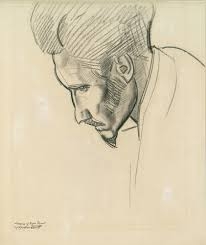 The second and obvious respect in which Pound was pagan was that he accepted as valid indigenous images, names, and myths, by which Deity has revealed Itself to the Europeans. He claimed that the only safe guides in religion were Ovid’s Metamorphoses and the writings of Confucius.[6] [8]
The second and obvious respect in which Pound was pagan was that he accepted as valid indigenous images, names, and myths, by which Deity has revealed Itself to the Europeans. He claimed that the only safe guides in religion were Ovid’s Metamorphoses and the writings of Confucius.[6] [8]
Which brings one to the third respect. He was pagan in his ethics, in the sense that he sought precepts that had arisen through tradition, were enshrined in custom, and were implicit in the natural order and man’s place within it. When he was captured by the partisans after the war and assumed he was about to face execution, it was the Analects of Confucius that he took with him, which he considered a better guide to moral behavior than the Bible: “The unshakable wisdom of Confucius . . . in comparison with which Christianity is a fad.”[7] [9]
In Pagan Ethics: Paganism as a World Religion,[8] [10] Professor Michael York unambiguously speaks of Confucianism as a religion, with its principles of solicitous care, decency, and benevolence, and the obverse of the Golden Rule: Do not do to others as you would not have done to yourself. Another example: Act in such a way that your descendants will be glad. In its emphasis on correct relationships between oneself and one’s family, between oneself and those above one and below one in society, between oneself and those who came before one in time, and between oneself and those who will come after one, Pound perceived the same multi-directional communitarian values that he found in Fascism.
Cut to London in the years following 1908, when Pound settled here. With the rise of science and biblical scholarship precipitating a crisis of faith in the mid-nineteenth century, some of the space hitherto occupied by the established denominations began to be filled by mysticism, occultism, and philosophies drawn from earlier times or from other parts of the world; and this was nowhere more evident than within the artistic circles in which Pound would move. The Theosophical Society was founded by Madame Blavatsky in 1875, and one of the emblematic texts of the aesthetic movement, Walter Pater’s work of fiction, Marius the Epicurean, appeared ten years later, providing a fully fleshed-out account of how non-Christian, Classical concepts of spirituality and the Good might be just as valid a way to live well as the prevailing religious norms.
The major source which fed Pound’s development as a religious thinker was, as has been indicated, Neo-Platonism, which is simply the continuation of Plato’s ideas, namely their elaboration and exegesis, principally through Plotinus but also through a host of others, including Marsilio Ficino and Pico della Mirandola in Italy, and later through the translations of the eighteenth-century English Neo-Platonist Thomas Taylor, whose books were read by and influenced poets such as Blake, Shelley, and Yeats.
What Pound found within Neo-Platonism was:
- The idea of henosis, that is to say union or reunion with the absolute One, which could manifest as a mystical experience. On his deathbed, Plotinus is reported to have summarized his teaching thus: “Try to bring back the god in oneself to the divine in the All.”[9] [11]
- The idea that an individual soul has a better, higher, and true self, and that this superior self seeks its return to the One that gave birth to all creation.
- The idea that experience results from the tension between the poles of the temporal and the eternal.
- The idea that the beauty of the absolute One descends into the beauty of the Platonic world of forms, and is then instantiated in the material world.
It seems Pound was congenitally disposed to such ideas. When interviewed during his stay in St. Elizabeth’s Hospital after his return to America in 1946, he said he had been under the influence of mysticism between the ages of 16 to 24.[10] [12] Later in his life, he wrote two refreshingly precise and disciplined statements of his own philosophy: “Religio, or the Child’s Guide to Knowledge (1918) and “Axiomata” (1923). The first is a catechism, a series of simple questions and answers which enunciates a pagan theology as well as any other text of such brevity of which I am aware.
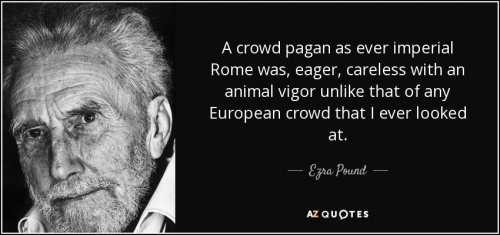
He was drawn to Plotinus because Plotinus defended the value of worldly sensations and attacked their rejection by the Gnostics, who thought physicality evil in some sense. He was drawn to the idea in Plotinus that the beauty of this world is the manifestation of a celestial beauty, which we may not be able to grasp but which is yet a glimpse of a paradise that imparts to us, within a limited time, an unlimited joy.
But unlike Plotinus, who thought that this glimpse into the world of ideal forms was but the penultimate stage in the union with the One, a union with the absolute, an entity without parts or qualities, Pound seemed to believe that this was an unwarranted assumption, which one’s highest experiences neither legitimated nor needed. His type of paganism was without dogmatism or unnecessary abstraction: “To replace the marble Goddess on Her pedestal at Terracina is worth more than any metaphysical argument.”[11] [13]
The vast, sprawling, expansive sequence of poems called The Cantos is Pound’s attempt to fashion a work that embraced all things that seemed relevant, all things that needed to be said. It makes use of twenty-five languages – twenty-six if one includes musical notation. It draws on Dante’s Divine Comedy in the progression from the dark depths to the upper regions; Ovid’s Metamorphoses in the treatment of impermanence and change, and of the human and the mythic; and Homer’s Odyssey, in the hero’s endeavor to succeed over obstacles and achieve victory, and victory not merely in worldly terms.
Plotinus regarded Homer’s Odyssey as a metaphor for the journey of the individual soul to return home into the Great Soul of the absolute, and this became for Pound almost a foundational myth for civilization. The Cantos begins therefore with an account of Odysseus making landfall and offering sacrifice to the gods. Paganism, in its Hellenic manifestation, he saw as the golden thread that ran overtly through the Classical era, covertly through the Middle Ages, and surfaced again in the Renaissance, indeed being implicit alongside the explicit Christianity of his favorite author, Dante Alighieri.
In the essay “Psychology and Troubadours” (1912), he posited a continuity of Classical paganism in the south of France:
Provence was less disturbed than the rest of Europe by invasion . . . if paganism survived anywhere, it would have been, unofficially, in the Langue d’Oc. That the spirit was, in Provence, Hellenic, is seen readily enough by anyone who will compare the Greek Anthology with the work of the Troubadours. They have, in some way, lost the names of the Gods, and remembered the names of lovers.[12] [14]
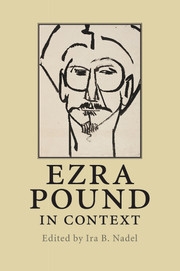 One recognizes a person that one actually knows by sight, by who the person is, not because of the name. A person may be called by different names yet be the same person still. “Tradition inheres in the images of the Gods, and gets lost in dogmatic definitions . . . But the images of the Gods . . . move the soul to contemplation and preserve the tradition of the undivided light.”[13] [15]
One recognizes a person that one actually knows by sight, by who the person is, not because of the name. A person may be called by different names yet be the same person still. “Tradition inheres in the images of the Gods, and gets lost in dogmatic definitions . . . But the images of the Gods . . . move the soul to contemplation and preserve the tradition of the undivided light.”[13] [15]
Before I close with a poem, I should like to put forward two conclusions.
First, with the insights into the Cantos offered by Neoplatonic paganism, one can put to one side some of the less inspiring critical readings – that it is a record of a lifetime’s reading, or an old man’s descent into confusion – and it becomes again the epic he intended it to be, the struggle of light against darkness, of heroes with themselves and with the world to reach a blessed place.
And second, with Pound’s veneration for the past and his appetite for the future, for making it new, as he put it, with his courage and capacity for friendship, with the range of his enthusiasms, and the range of what he was not satisfied with, he is an ideal figure to head any movement of European rebirth. And this poem, “Surgit Fama”[14] [16] (“it rises to fame”), seems to be about that more than anything else. The first stanza depicts a stirring in the world, the coming of Korè who is Persephone, the returning and reborn Spring; in consort with Leuconoë, the girl to whom Horace addresses the famous injunction to seize the day, carpe diem.[15] [17] In the second stanza, when the poet tries to render this into verse, he has to resist any superfluity, any unnecessary words that may be circulated as rumor or bent in their meaning, which he feels Hermes may tempt him to, and he addresses himself, exhorting himself to speak true. And in the final stanza that is what he does, when he says how in Delos, the island where it was said Apollo and Artemis were born, once again shall rites be enacted and the story continued.
There is a truce among the Gods,
Korè is seen in the North
Skirting the blue-gray sea
In gilded and russet mantle.
The corn has again its mother and she, Leuconoë,
That failed never women,
Fails not the earth now.
The tricksome Hermes is here;
He moves behind me
Eager to catch my words,
Eager to spread them with rumour;
To set upon them his change
Crafty and subtle;
To alter them to his purpose;
But do thou speak true, even to the letter:
“Once more in Delos, once more is the altar a quiver.
Once more is the chant heard.
Once more are the never abandoned gardens
Full of gossip and old tales.”
Notes
[1] [18] Ezra Pound, “Statues of Gods,” The Townsman, August 1939; in William Cookson (ed.), Ezra Pound, Selected Prose 1909-1965 (London: Faber and Faber, 1973), p. 71.
[2] [19] Ezra Pound, “Deus et Amor,” The Townsman, June 1940; Selected Prose, p. 72.
[3] [20] Ezra Pound, “Terra Italica,” The New Review, Winter, 1931-2; Selected Prose, p. 56.
[4] [21] Ezra Pound, The Cantos (London: Faber and Faber, 1975), p. 743.
[5] [22] Michael John King (ed.), The Collected Early Poems of Ezra Pound, ed. Michael John King (London: Faber and Faber, 1977), p. 7.
[6] [23] In a letter from 1922 to Dr. Felix E. Schelling, in D. D. Paige (ed.), The Selected Letters of Ezra Pound, 1907-1941 (London: Faber and Faber, 1950), p. 182.
[7] [24] “Statues of Gods,” Selected Prose, p. 71.
[8] [25] Michael York, Pagan Ethics: Paganism as a World Religion (Cham: Springer International Publishing, 2016), p. 356.
[9] [26] Porphyry, The Life of Plotinus, in Plotinus, vol. I, trans. Arthur Hilary Armstrong (Cambridge, Mass.: Loeb Classics, Harvard University Press, 1995), p. 7.
[10] [27] Peter Liebregts, Ezra Pound and Neoplatonism (Madison: Rosemont Publishing, 2004), p. 34.
[11] [28] Ezra Pound, “A Visiting Card,” written in Italian and first published in Rome in 1942; the translation by John Drummond was first published by Peter Russell in 1952; Selected Prose, p. 290.
[12] [29] Ezra Pound, The Spirit of Romance (London: Peter Owen, 1952), p. 90.
[13] [30] “A Visiting Card”; Selected Prose, p. 277.
[14] [31] Ezra Pound, Collected Shorter Poems (London: Faber and Faber, 1952), p. 99.
[15] [32] Horace, Odes, I, XI.





 del.icio.us
del.icio.us
 Digg
Digg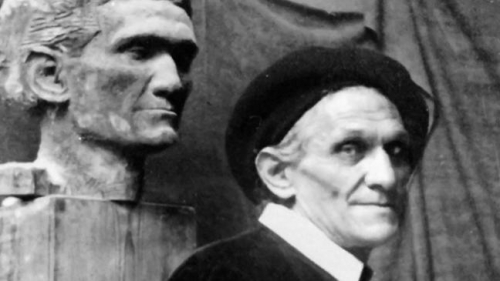
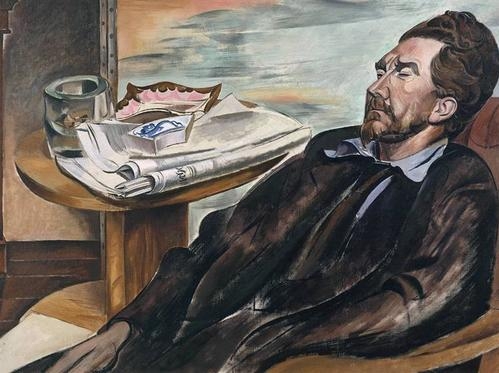

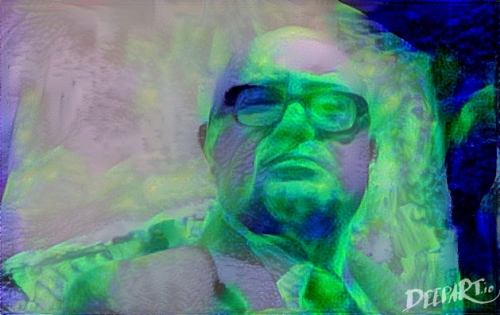
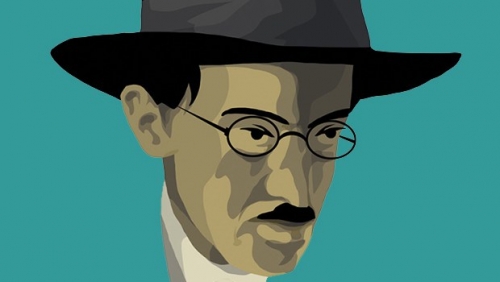
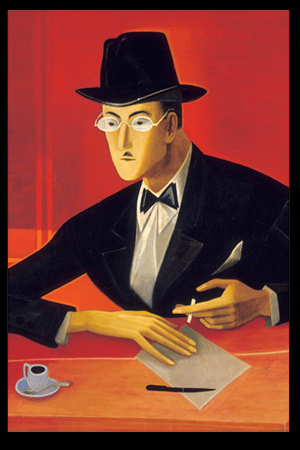 One of his earliest influences was Thomas Carlyle, whose concept of the “hero as poet” as described in Heroes, Hero-Worship, and the Heroic in History made a particular impression on him; from a young age, Pessoa saw his vocation as a poet as an heroic, almost messianic calling.
One of his earliest influences was Thomas Carlyle, whose concept of the “hero as poet” as described in Heroes, Hero-Worship, and the Heroic in History made a particular impression on him; from a young age, Pessoa saw his vocation as a poet as an heroic, almost messianic calling.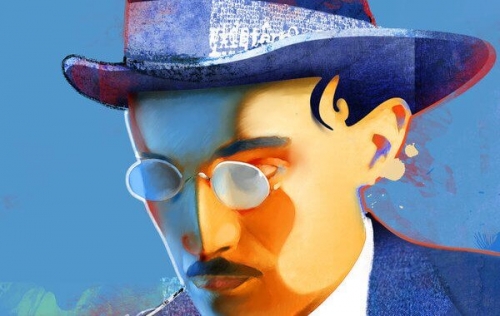
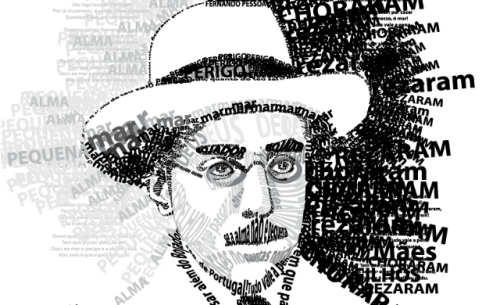
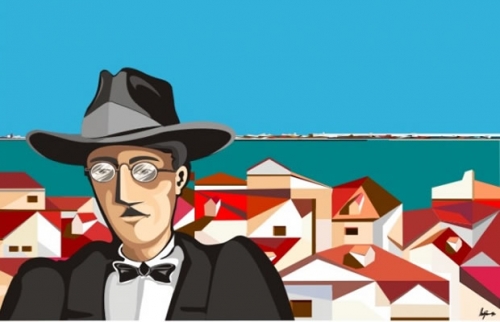
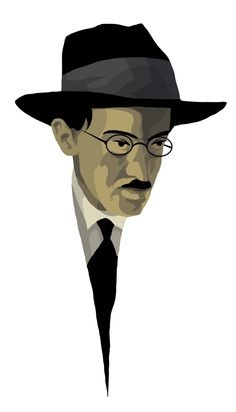 Pessoa was also fascinated with the occult and wrote extensively on the subject, largely under his own name. In 1915, he began translating theosophist texts and later claimed to have become a medium with the ability to produce automatic writing. He also claimed to have “sudden flashes of ‘etheric vision'” that enabled him to perceive certain symbols and “auras.”
Pessoa was also fascinated with the occult and wrote extensively on the subject, largely under his own name. In 1915, he began translating theosophist texts and later claimed to have become a medium with the ability to produce automatic writing. He also claimed to have “sudden flashes of ‘etheric vision'” that enabled him to perceive certain symbols and “auras.”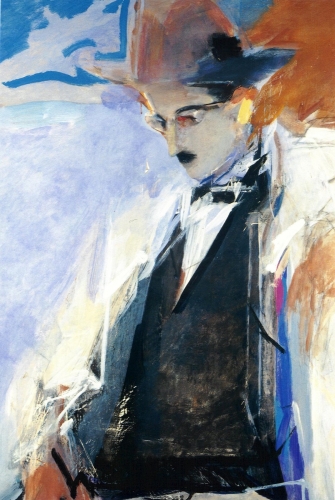 The theme of decay and the need for national regeneration runs throughout his political writings, particularly his unfinished “History of a Dictatorship,” a survey of modern Portuguese history in which he attempts to outline the causes for Portugal’s decline.
The theme of decay and the need for national regeneration runs throughout his political writings, particularly his unfinished “History of a Dictatorship,” a survey of modern Portuguese history in which he attempts to outline the causes for Portugal’s decline.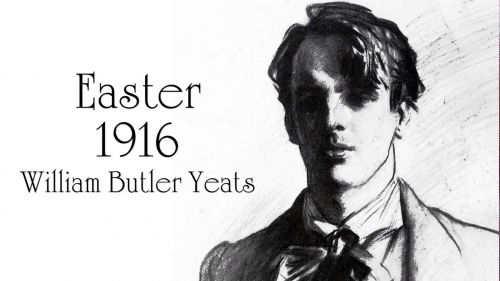
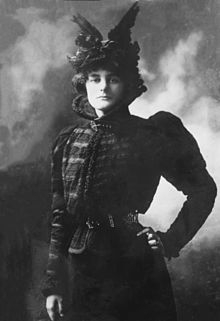 At an early age Yeats became involved in mysticism which would prove controversial his whole life. Kodani explains, “The early poetry of William Butler Yeats was very much bound up with the forces and interests of his early years. Many of these influences — such as that of Maud Gonne, his father, and his own mystic studies — have been elucidated by some careful scholarship.” Yeats’ writing was influenced by his study of mysticism. He joined the Theosophical Society as his immediate family’s tradition was not very religious. Later he “became interested in esoteric philosophy, and in 1890 was initiated into the Hermetic Order of the Golden Dawn” (Seymour-Smith). He would pursue mystical philosophy the rest of his life to a greater or lesser degree.
At an early age Yeats became involved in mysticism which would prove controversial his whole life. Kodani explains, “The early poetry of William Butler Yeats was very much bound up with the forces and interests of his early years. Many of these influences — such as that of Maud Gonne, his father, and his own mystic studies — have been elucidated by some careful scholarship.” Yeats’ writing was influenced by his study of mysticism. He joined the Theosophical Society as his immediate family’s tradition was not very religious. Later he “became interested in esoteric philosophy, and in 1890 was initiated into the Hermetic Order of the Golden Dawn” (Seymour-Smith). He would pursue mystical philosophy the rest of his life to a greater or lesser degree.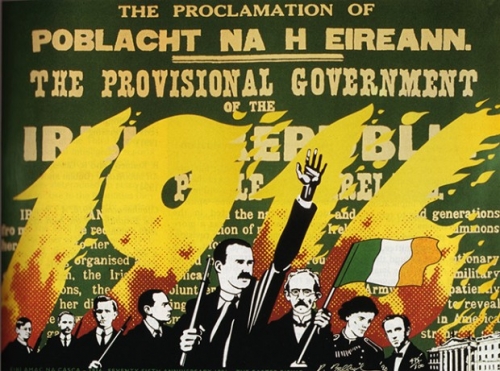
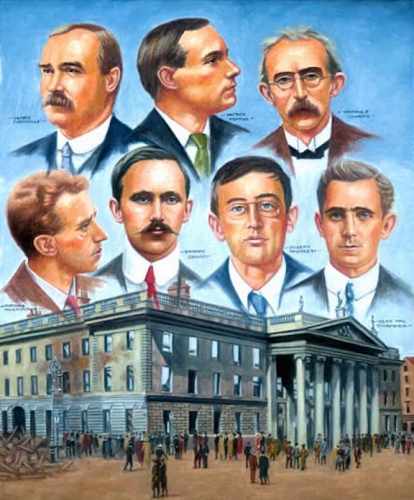
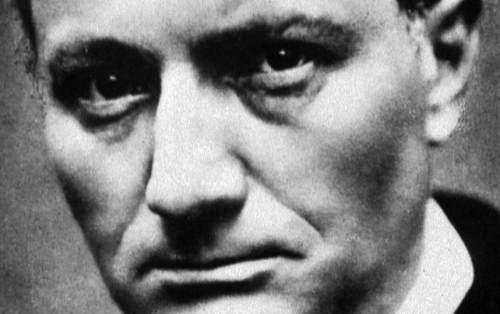
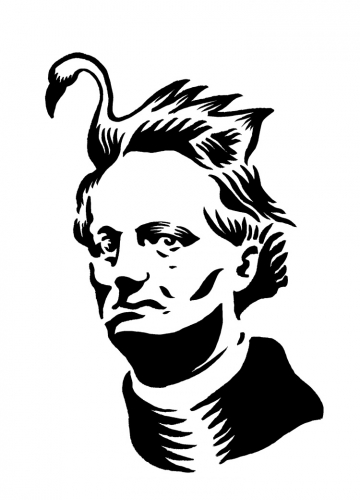 […] Mais où est, je vous prie, la garantie du progrès pour le lendemain ? Car les disciples des philosophes de la vapeur et des allumettes chimiques l’entendent ainsi : le progrès ne leur apparaît que sous la forme d’une série indéfinie. Où est cette garantie ? Elle n’existe, dis-je, que dans votre crédulité et votre fatuité.
[…] Mais où est, je vous prie, la garantie du progrès pour le lendemain ? Car les disciples des philosophes de la vapeur et des allumettes chimiques l’entendent ainsi : le progrès ne leur apparaît que sous la forme d’une série indéfinie. Où est cette garantie ? Elle n’existe, dis-je, que dans votre crédulité et votre fatuité.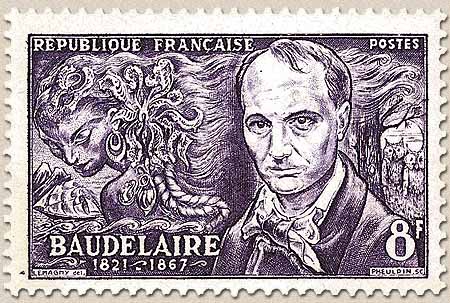
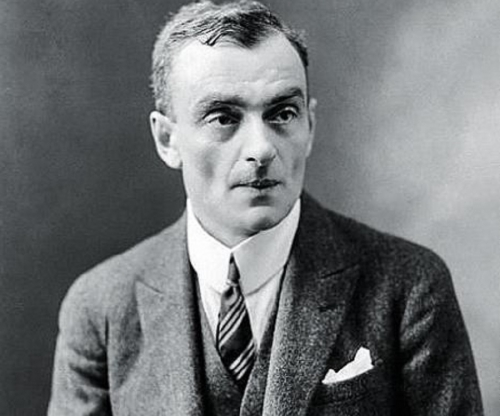
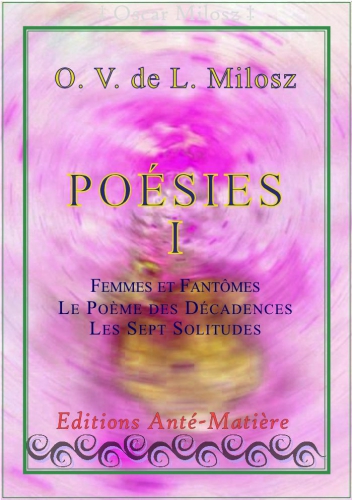 Si le propre des grands poètes est de demeurer longtemps méconnus avant de nous advenir en gloires et ensoleillements sans doute est-ce qu'ils entretiennent avec la profondeur du temps une relation privilégiée. Leurs œuvres venues de profond et de loin tardent à nous parvenir. Elles sont ce « Printemps revenu de ses lointains voyages », - revenu vers nous avec sa provende d'essences, d'ombres bleues, de pressentiments.
Si le propre des grands poètes est de demeurer longtemps méconnus avant de nous advenir en gloires et ensoleillements sans doute est-ce qu'ils entretiennent avec la profondeur du temps une relation privilégiée. Leurs œuvres venues de profond et de loin tardent à nous parvenir. Elles sont ce « Printemps revenu de ses lointains voyages », - revenu vers nous avec sa provende d'essences, d'ombres bleues, de pressentiments. 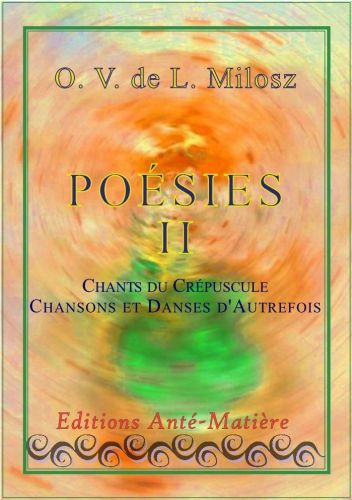 Ce temps n'est pas un temps linéaire, le temps de la succession, le temps historique mais le temps métahistorique, s'inscrivant dans une hiéro-histoire: c'est là tout le propos des Arcanes de Milosz. Ce savoir ne sera pas conquête arrogante, mais retour en nous de l'humilité, non pas savoir qui planifie, qui arraisonne le monde par outrecuidance, par outrance, mais retour à la simple dignité des êtres et des choses, des pierres, des feuillages, des océans, des oiseaux.
Ce temps n'est pas un temps linéaire, le temps de la succession, le temps historique mais le temps métahistorique, s'inscrivant dans une hiéro-histoire: c'est là tout le propos des Arcanes de Milosz. Ce savoir ne sera pas conquête arrogante, mais retour en nous de l'humilité, non pas savoir qui planifie, qui arraisonne le monde par outrecuidance, par outrance, mais retour à la simple dignité des êtres et des choses, des pierres, des feuillages, des océans, des oiseaux. 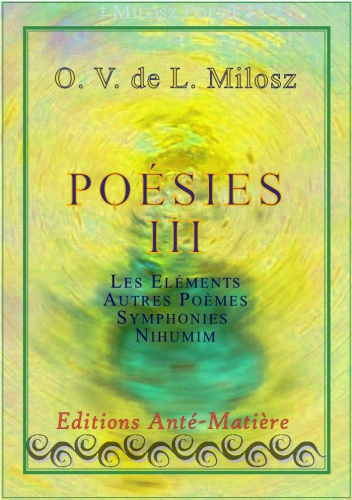 Certains hommes, plus que d'autres, par l'appartenance à une caste intérieure, sont prédisposés à entrer en relation avec le monde intermédiaire, là où apparaissent les Anges, les visions, les dieux. Ce mundus imaginalis, ce monde imaginal, fut la véritable patrie de Milosz comme elle fut celle de Gérard de Nerval ou de Ruzbéhân de Shîraz. Ce monde visionnaire n'a rien d'abstrus, de subjectif ni d'irréel. Il est, pour reprendre le paradoxe lumineux d'Henry Corbin « un suprasensible concret », - non pas la réalité, qui n'est jamais qu'une représentation, mais le réel, ensoleillé ou ténébreux, le réel en tant que mystère, source d'effroi, d'étonnement ou de ravissements sans fins.
Certains hommes, plus que d'autres, par l'appartenance à une caste intérieure, sont prédisposés à entrer en relation avec le monde intermédiaire, là où apparaissent les Anges, les visions, les dieux. Ce mundus imaginalis, ce monde imaginal, fut la véritable patrie de Milosz comme elle fut celle de Gérard de Nerval ou de Ruzbéhân de Shîraz. Ce monde visionnaire n'a rien d'abstrus, de subjectif ni d'irréel. Il est, pour reprendre le paradoxe lumineux d'Henry Corbin « un suprasensible concret », - non pas la réalité, qui n'est jamais qu'une représentation, mais le réel, ensoleillé ou ténébreux, le réel en tant que mystère, source d'effroi, d'étonnement ou de ravissements sans fins. 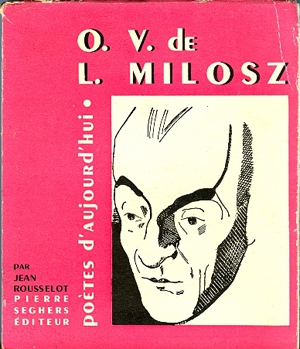 « Je regarde, écrit Milosz, et que vois-je ? La pureté surnage, le blanc et le bleu surnagent. L'esprit de jalousie, le maître de pollution, l'huile de rongement aveugle, lacrymale, plombée, dans la région basse est tombé. Lumière d'or chantée, tu te délivres. Viens épouse, venez enfants, nous allons vivre ! » A ce beau pressentiment répond, dans le même poème la voix de Béatrice: « Montjoie Saint-Denis, maître ! Les nôtres, rapides, rapides, ensoleillés ! Au maître des obscurs on fera rendre gorge. Vous George, Michel, claires têtes, saintes tempêtes d'ailes éployées, et toi si blanc d'amour sous l'argent et le lin... »
« Je regarde, écrit Milosz, et que vois-je ? La pureté surnage, le blanc et le bleu surnagent. L'esprit de jalousie, le maître de pollution, l'huile de rongement aveugle, lacrymale, plombée, dans la région basse est tombé. Lumière d'or chantée, tu te délivres. Viens épouse, venez enfants, nous allons vivre ! » A ce beau pressentiment répond, dans le même poème la voix de Béatrice: « Montjoie Saint-Denis, maître ! Les nôtres, rapides, rapides, ensoleillés ! Au maître des obscurs on fera rendre gorge. Vous George, Michel, claires têtes, saintes tempêtes d'ailes éployées, et toi si blanc d'amour sous l'argent et le lin... » 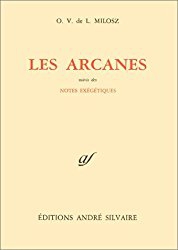 Contraires à l'œuvre et à la prière, de titanesques forces sont au travail pour nous distraire et nous soumettre. L'idéal guerroyant, chevaleresque, opposera au coup de force permanent du monde moderne, non pas une force contraire, qui serait son image inversée et sa caricature, mais une persistante douceur et d'infinies nuances.
Contraires à l'œuvre et à la prière, de titanesques forces sont au travail pour nous distraire et nous soumettre. L'idéal guerroyant, chevaleresque, opposera au coup de force permanent du monde moderne, non pas une force contraire, qui serait son image inversée et sa caricature, mais une persistante douceur et d'infinies nuances. 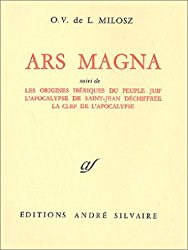 Le Noble Voyageur s'éloigne pour revenir. Il quitte la lettre pour cheminer vers l'aurore du sens, - qui viendra, en rosées alchimiques, se reposer sur la lettre pour l'enluminer. « Le monde, disaient les théologiens du Moyen-Age, est l'enluminure de l'écriture de Dieu ». Le voyage initiatique, la quête du Graal, qui n'est autre que la coupe du ciel retournée sur nos têtes, débute par l'expérience du trouble, de l'inquiétude, du vertige: « J'ai porté sur ma poitrine, écrit Milosz, le poids de la nuit, mon front a distillé une sueur de mur. J'ai tourné la roue d'épouvante de ceux qui partent et de ceux qui reviennent. Il ne reste de moi en maint endroit qu'un cercle d'or tombé dans une poignée de poussière. »
Le Noble Voyageur s'éloigne pour revenir. Il quitte la lettre pour cheminer vers l'aurore du sens, - qui viendra, en rosées alchimiques, se reposer sur la lettre pour l'enluminer. « Le monde, disaient les théologiens du Moyen-Age, est l'enluminure de l'écriture de Dieu ». Le voyage initiatique, la quête du Graal, qui n'est autre que la coupe du ciel retournée sur nos têtes, débute par l'expérience du trouble, de l'inquiétude, du vertige: « J'ai porté sur ma poitrine, écrit Milosz, le poids de la nuit, mon front a distillé une sueur de mur. J'ai tourné la roue d'épouvante de ceux qui partent et de ceux qui reviennent. Il ne reste de moi en maint endroit qu'un cercle d'or tombé dans une poignée de poussière. » 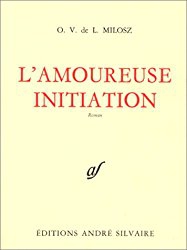 Le propre de la poésie est d'honorer le silence, - ce silence qui est en amont, antérieur, ce silence d'or qui tisse de ses fils toute musique, ce silence que les Muses savent écouter et qu'elles transmettent à leurs interprètes afin de faire entendre la vox cordis, la voix du cœur, qui vient de la profondeur du Temps.
Le propre de la poésie est d'honorer le silence, - ce silence qui est en amont, antérieur, ce silence d'or qui tisse de ses fils toute musique, ce silence que les Muses savent écouter et qu'elles transmettent à leurs interprètes afin de faire entendre la vox cordis, la voix du cœur, qui vient de la profondeur du Temps. 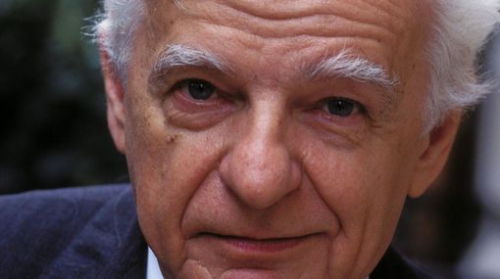
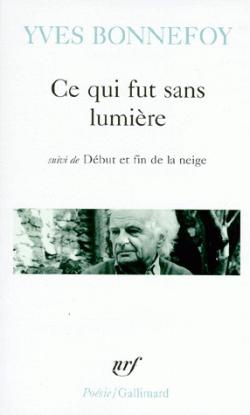 L'horizon intellectuel du poète sera celui d'une recherche incessante. Sa soif de l'éternel, de l'unité perdue, de ce qui peut-être n'existe pas mais qu'on ne renonce jamais à atteindre, constitue son acte d'écrire, celui d'un devenir que le poème met en mouvement. L'oeuvre d'Yves Bonnefoy, qui semble être un des rares poètes à susciter l'unanimité d'estime et d'admiration de ses contemporains, n'appartient à aucune école, à aucune chapelle littéraire. Elle s'approfondit au long d'un parcours d'une rigueur et d'une authenticité qu'il faut souligner. Ses textes - poésie, prose, essai - comportent une suite de moments comparables à des voyages, à des passages, à des traversées, où veillent un désir partagé entre le passé et le puissant attrait de l'avenir, le froid nocturne et la chaleur d'un feu nouveau, la dénonciation du leurre et la visée du but.
L'horizon intellectuel du poète sera celui d'une recherche incessante. Sa soif de l'éternel, de l'unité perdue, de ce qui peut-être n'existe pas mais qu'on ne renonce jamais à atteindre, constitue son acte d'écrire, celui d'un devenir que le poème met en mouvement. L'oeuvre d'Yves Bonnefoy, qui semble être un des rares poètes à susciter l'unanimité d'estime et d'admiration de ses contemporains, n'appartient à aucune école, à aucune chapelle littéraire. Elle s'approfondit au long d'un parcours d'une rigueur et d'une authenticité qu'il faut souligner. Ses textes - poésie, prose, essai - comportent une suite de moments comparables à des voyages, à des passages, à des traversées, où veillent un désir partagé entre le passé et le puissant attrait de l'avenir, le froid nocturne et la chaleur d'un feu nouveau, la dénonciation du leurre et la visée du but.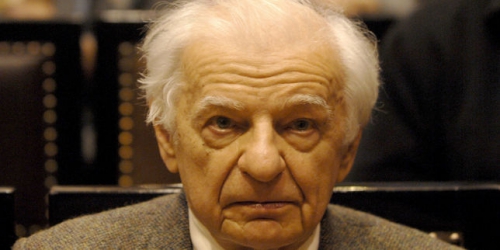
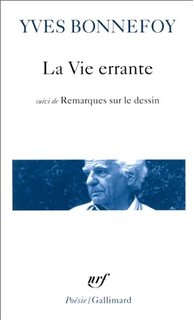 Né à Tours le 24 juin 1923, grandi dans cette ville, puis arrivé à Paris, fin 1943, pour compléter une licence de mathématiques, il gravita tout d’abord dans l’orbite du surréalisme dont l’utopie lui parut tout d’abord confirmer son désir de trouver les «secrets pour changer la vie», mais il s’en sépara assez vite, faute d’en partager la mystique.
Né à Tours le 24 juin 1923, grandi dans cette ville, puis arrivé à Paris, fin 1943, pour compléter une licence de mathématiques, il gravita tout d’abord dans l’orbite du surréalisme dont l’utopie lui parut tout d’abord confirmer son désir de trouver les «secrets pour changer la vie», mais il s’en sépara assez vite, faute d’en partager la mystique. 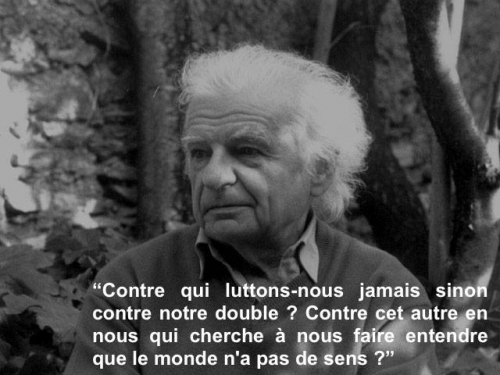
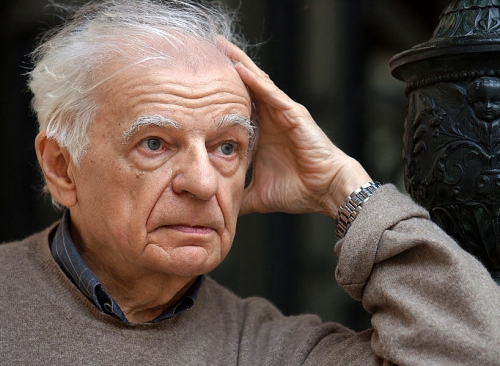
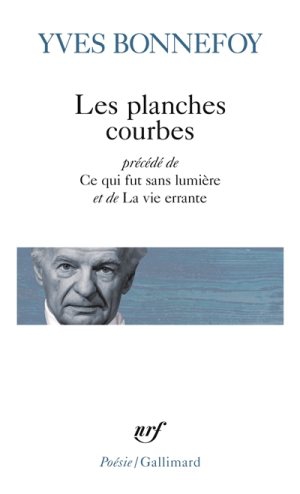 Il fraye alors avec les surréalistes. À 23 ans, son premier poème « Le Cœur-espace » paraît dans la revue La Révolution la nuit. Suivent, alors même qu’il prend de la distance avec André Breton et ses comparses, ses premiers recueils dont Anti-Platon en 1947, réunissant ses premiers poèmes ont paru dans des revues confidentielles, où il affime sa défiance envers l’idéalisme, et Du mouvement et de l’immobilité de Douve en 1953, très vite remarqué par
Il fraye alors avec les surréalistes. À 23 ans, son premier poème « Le Cœur-espace » paraît dans la revue La Révolution la nuit. Suivent, alors même qu’il prend de la distance avec André Breton et ses comparses, ses premiers recueils dont Anti-Platon en 1947, réunissant ses premiers poèmes ont paru dans des revues confidentielles, où il affime sa défiance envers l’idéalisme, et Du mouvement et de l’immobilité de Douve en 1953, très vite remarqué par 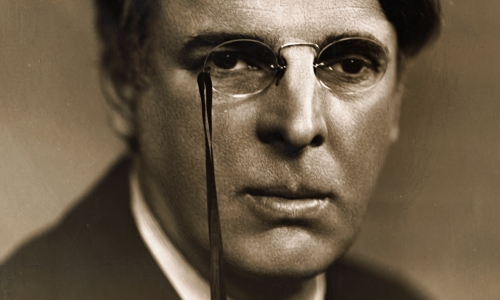
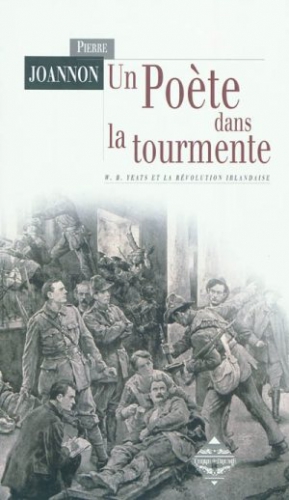
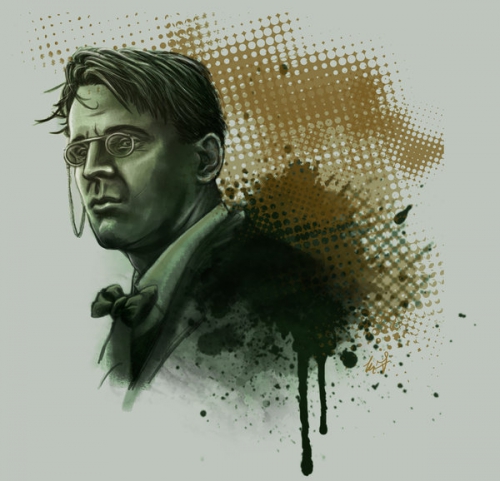
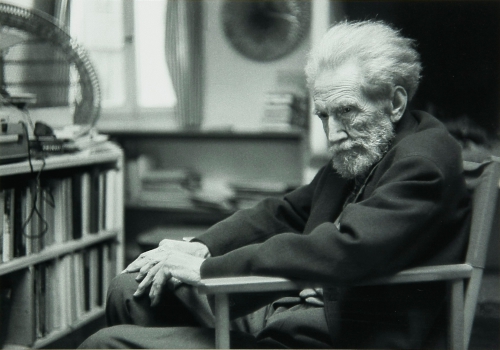
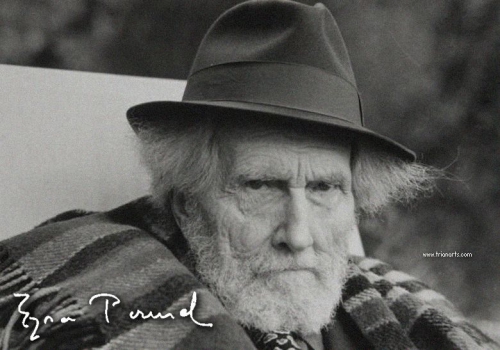
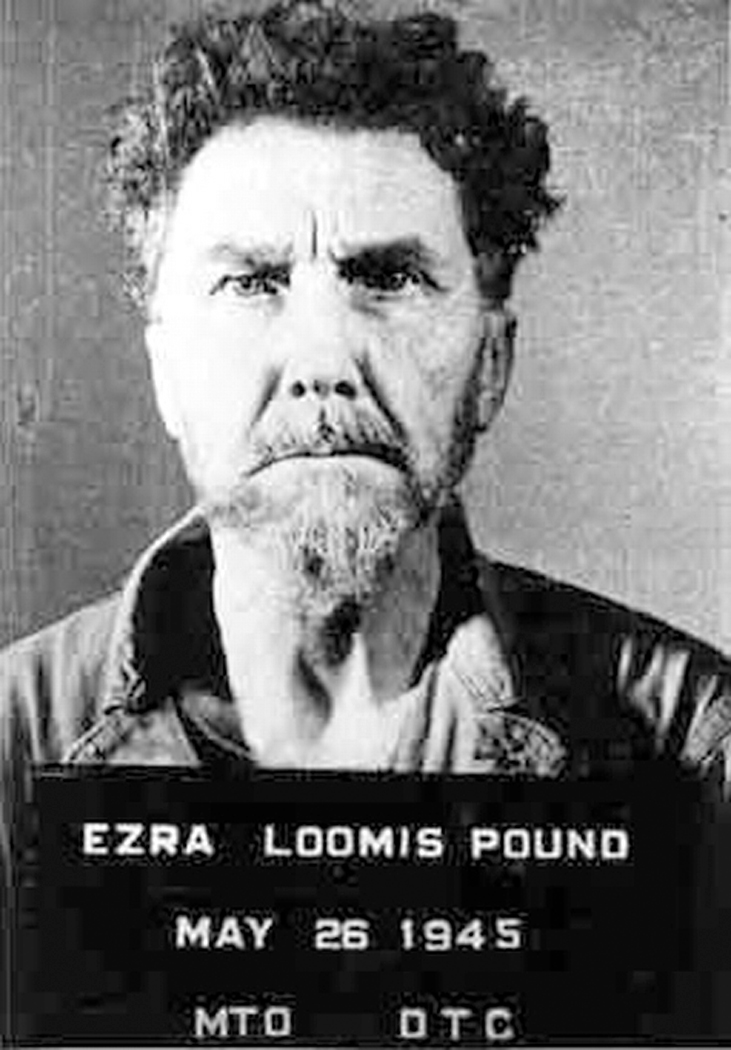
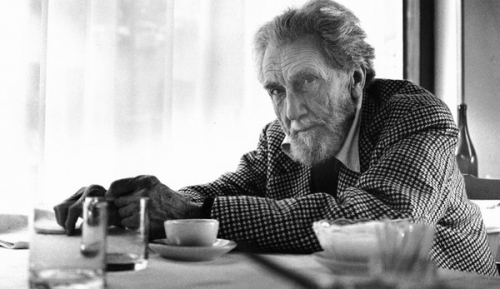
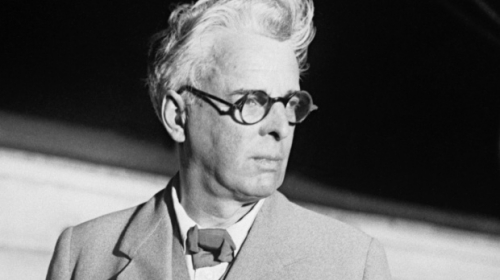
![william-butler-yeats-by-reemerv[162091].jpg](http://euro-synergies.hautetfort.com/media/01/02/2740805010.jpg) The falcon is modern man. The motive force of the falcon’s flight is human desire, pride, spiritedness, and Faustian striving. The spiral structure of the flight is the intelligible measure–the moderation and moralization of human desire and action–imposed by the moral center of our civilization, represented by the falconer, the falcon’s master, our master, which I interpret in Nietzschean terms as the highest values of our culture. The tether that holds us to the center and allows it to impose measure on our flight is the “voice of God,” i.e., the claim of the values of our civilization upon us; the ability of our civilization’s values to move us.
The falcon is modern man. The motive force of the falcon’s flight is human desire, pride, spiritedness, and Faustian striving. The spiral structure of the flight is the intelligible measure–the moderation and moralization of human desire and action–imposed by the moral center of our civilization, represented by the falconer, the falcon’s master, our master, which I interpret in Nietzschean terms as the highest values of our culture. The tether that holds us to the center and allows it to impose measure on our flight is the “voice of God,” i.e., the claim of the values of our civilization upon us; the ability of our civilization’s values to move us.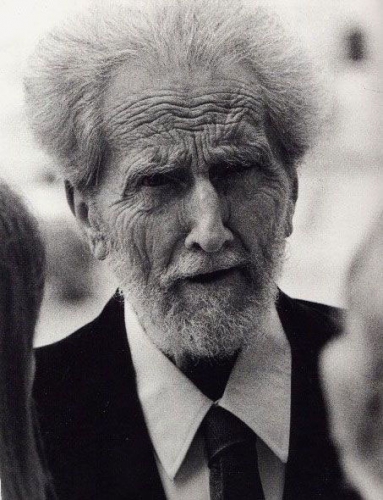 Au mois de novembre 1972, disparaissait le génial Ezra Pound dont la lutte contre l’usure fut une direction fondamentale de la vie et de l’œuvre. Les
Au mois de novembre 1972, disparaissait le génial Ezra Pound dont la lutte contre l’usure fut une direction fondamentale de la vie et de l’œuvre. Les 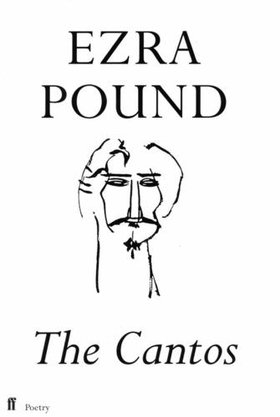 Si Pound n’est pas apprécié dans les médias, la raison en est son immense lucidité. Il a accepté la responsabilité historique d’écrire à contre courant, d’être un rebelle à temps complet. Son talent secouait la médiocrité et le mensonge. Son œuvre fonctionne comme un miroir dans lequel les trafiquants voient leur infâmie. Tout cela a été délégitimé par l’industrie du spectacle et les prédicateurs médiatiques. L’écrivain contemporain, celui pour qui les lobbys obtiendront un prix “ en souvenir de Nobel”, n’est plus qu’un propagandiste du meilleur des mondes. Pound reste l’ultime manifestation de l’esprit, incarne l’aède antique même si en ce moment les shopping center ont remplacé le forum.
Si Pound n’est pas apprécié dans les médias, la raison en est son immense lucidité. Il a accepté la responsabilité historique d’écrire à contre courant, d’être un rebelle à temps complet. Son talent secouait la médiocrité et le mensonge. Son œuvre fonctionne comme un miroir dans lequel les trafiquants voient leur infâmie. Tout cela a été délégitimé par l’industrie du spectacle et les prédicateurs médiatiques. L’écrivain contemporain, celui pour qui les lobbys obtiendront un prix “ en souvenir de Nobel”, n’est plus qu’un propagandiste du meilleur des mondes. Pound reste l’ultime manifestation de l’esprit, incarne l’aède antique même si en ce moment les shopping center ont remplacé le forum.
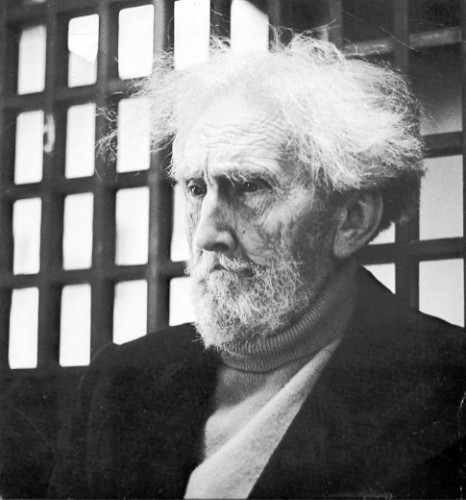

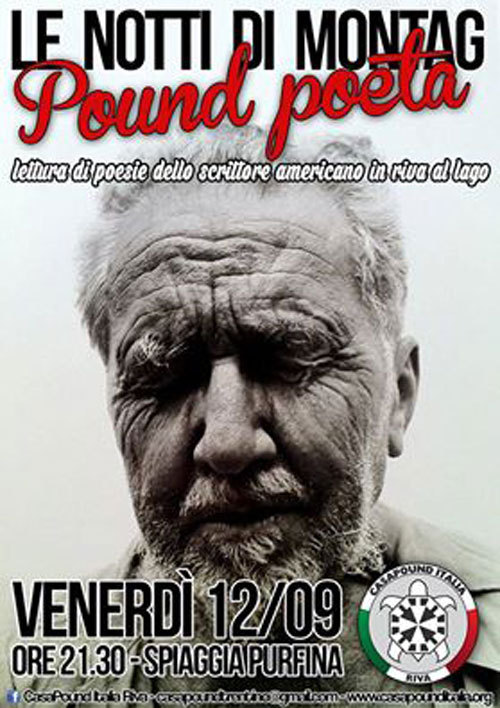
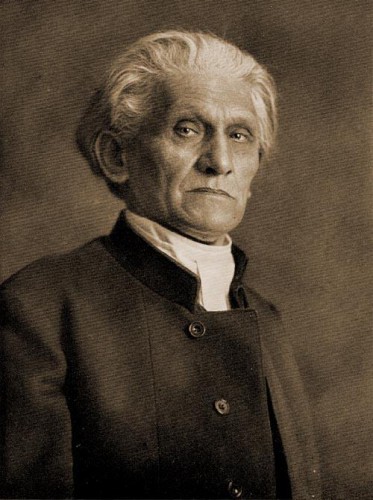
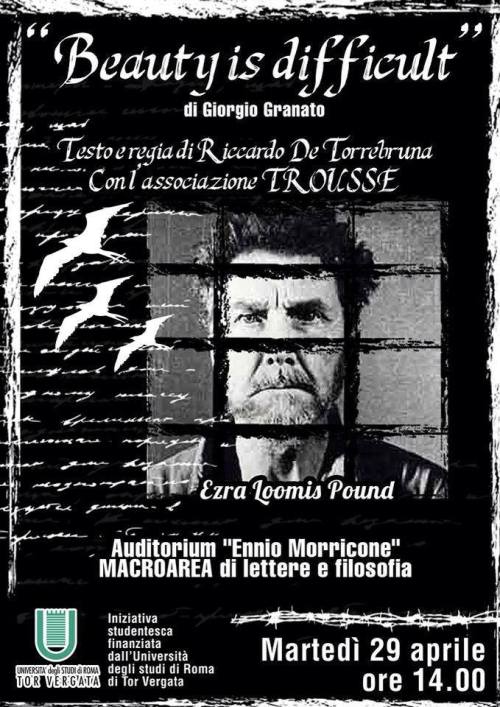
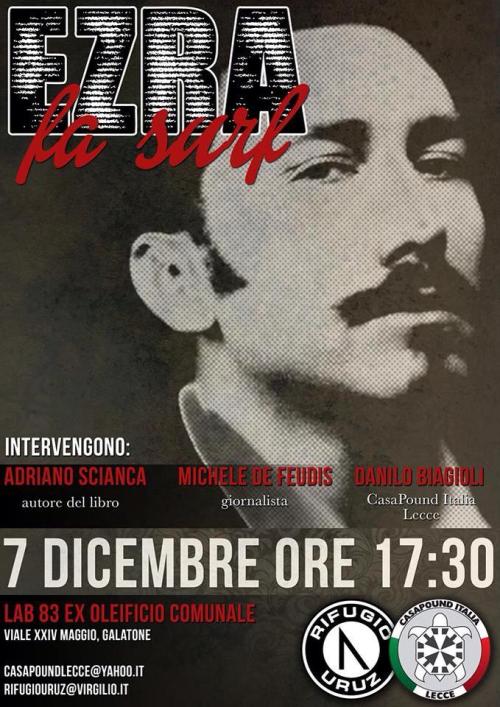
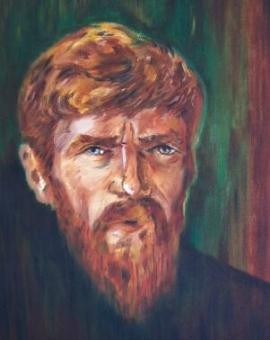 When the ban on D.H. Lawrence’s controversial novel, Lady Chatterley’s Lover, was finally lifted in 1960 it was a watershed moment for censorship in Britain. But many assume it was only Lawrence’s novels that suffered at the hands of the censors.
When the ban on D.H. Lawrence’s controversial novel, Lady Chatterley’s Lover, was finally lifted in 1960 it was a watershed moment for censorship in Britain. But many assume it was only Lawrence’s novels that suffered at the hands of the censors.